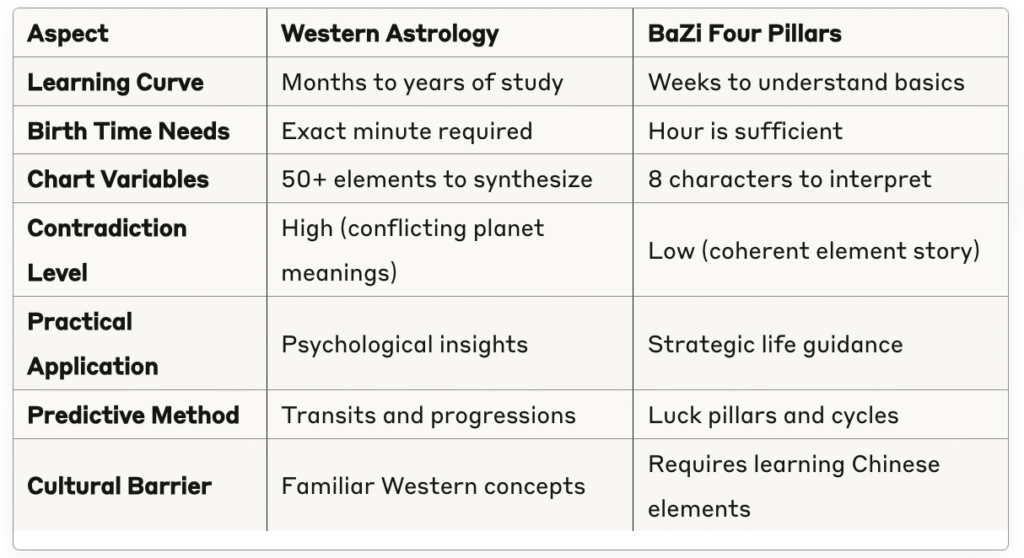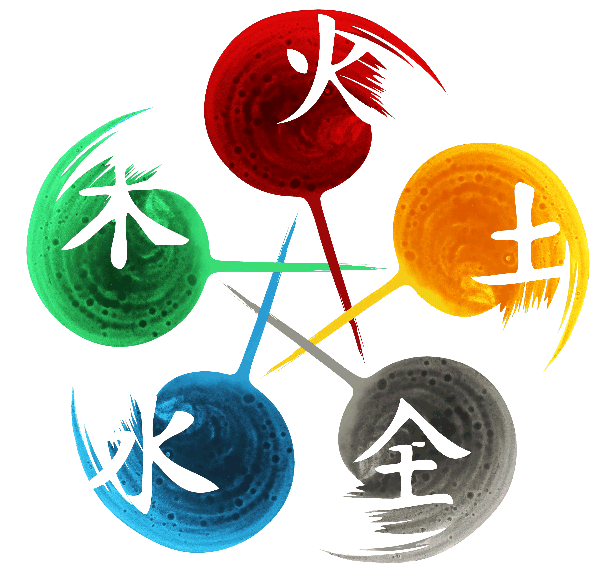I spent nine years collecting contradictory astrology readings, calculating my birth chart dozens of times, and wondering why my Libra sun and Scorpio rising never quite explained why I operated the way I did.
Then I discovered BaZi (Four Pillars Chinese astrology) – and suddenly everything that confused me about Western astrology finally made sense.
If you’ve ever felt lost in the complexity of birth charts, houses, and planetary transits, or frustrated by astrology readings that felt only half-accurate, this comparison might save you years of confusion.
My Astrology Struggle: When Complexity Becomes Chaos
Picture this: You’re reading that you’re a “natural leader” because of your Leo rising, but also “deeply sensitive and withdrawn” due to your Cancer moon, while simultaneously being told you’re “analytical and detail-oriented” because of your Virgo stellium.
Which one is actually you?
This was my life for nine years. Every new astrology book or website would add another layer of complexity:
- Planetary aspects (“Your Mars square Neptune creates confusion about action”)
- House systems (“But in Placidus vs. Whole Sign, your planets fall in different houses”)
- Progressions and transits (“This explains why you felt different three years ago”)
I collected so much contradictory information that I started questioning whether astrology worked at all – or if I was just terrible at interpreting it.

The Birth Time Problem That Nearly Broke Me
Here’s what nobody tells you about Western astrology: being off by even 30 minutes can completely change your chart.
Your rising sign? Could be wrong. Your house placements? Might be totally different. That detailed personality reading you paid for? Based on incorrect data.
My parents vaguely remembered I was born “in the evening,” which gave me about a four-hour window. I calculated charts for every possible birth time, getting different results each time. Some made me a Gemini rising (social butterfly), others made me Cancer rising (homebody).
Which version was the “real” me?
Then I Discovered BaZi: The Four Pillars System That Actually Made Sense
A few months ago, I stumbled across BaZi – Chinese Four Pillars astrology – and everything changed.
Where Western astrology gave me a complex wheel with dozens of moving parts, BaZi gave me exactly eight characters arranged in four pillars. That’s it.
But here’s what blew my mind: these eight simple characters told a more coherent story about my personality than nine years of detailed birth chart analysis.

BaZi vs Western Astrology: The Key Differences
Complexity: 8 Characters vs 50+ Variables
Western Astrology:
- 10 planets in 12 signs
- 12 houses with different systems
- Dozens of aspects between planets
- Progressions, transits, returns
- Result: Hundreds of variables to interpret
BaZi Four Pillars:
- 4 pillars (Year, Month, Day, Hour)
- 2 characters per pillar (8 total)
- Based on 5 Elements + Yin/Yang
- Result: Simple, clear patterns you can actually follow
Birth Time Accuracy: Minutes vs Hours
Western Astrology:
- Needs exact minute of birth
- Rising sign changes every ~2 hours
- House positions shift significantly
- Small timing errors = completely different chart
BaZi:
- Hour of birth is usually sufficient
- More forgiving with approximate timing
- Practitioners can work with uncertain birth times
- Chart stays consistent within broader time ranges
Interpretation: Psychology vs Strategy
Western Astrology:
- “What are you like psychologically?”
- Focuses on personality traits and cosmic influences
- Abstract concepts (houses, aspects, transits)
- Often contradictory layers of meaning
BaZi Four Pillars:
- “How do you operate most effectively?”
- Focuses on energy balance and practical guidance
- Concrete element interactions (Fire melts Metal, Water nourishes Wood)
- Coherent strategy for working with your nature
Why BaZi Element Interactions Actually Make Sense
Remember struggling to understand why “Venus square Mars creates tension between love and desire”?
In BaZi, element relationships are intuitive:
- Wood destroys Earth (trees sap nutrients from soil)
- Fire strengthens Earth (fire creates ash, enriching soil)
- Metal cuts Wood (axes chop trees)
- Water nourishes Wood (plants need water to grow)
- Earth produces Metal (metals are mined from earth)
These aren’t abstract concepts – they’re natural processes you can visualize and understand immediately.

My Personal Experience: Western Astrology vs BaZi Accuracy
What Western Astrology Told Me:
- Libra sun: “Seeks balance and harmony” (sort of true?)
- Scorpio rising: “Intense, mysterious, transformative” (sometimes?)
- Multiple planet placements creating a contradictory mix of traits
I spent years trying to reconcile these different aspects, never feeling like I had a complete picture.
What BaZi Showed Me:
- Yang Water Day Master: “Adaptable like a river, powerful when flowing, stagnates when blocked”
- All-Yang chart: “High energy, needs constant movement and expression”
- Clear element interactions showing my optimal environments and relationships
The BaZi description felt like someone had been watching my life for years. Every major pattern – why I thrived in fluid environments, why rigid structures drained me, why I needed variety and growth – suddenly made perfect sense.
The Four Pillars Breakdown: Why This System Works Better
Instead of trying to synthesize dozens of planetary placements, BaZi gives you four clear life areas:
Year Pillar: Ancestry and early influences (your foundation)
Month Pillar: Career and authority relationships (your public life)
Day Pillar: Core personality and marriage (who you are)
Hour Pillar: Children, creativity, legacy (your expression)
Each pillar contains two characters, creating a comprehensive but manageable picture of your entire life pattern.
Compare this to Western astrology, where you’re trying to integrate:
- Sun sign + Moon sign + Rising sign
- Planet placements in houses
- Aspects between planets
- Current transits affecting everything
- Progressions showing your “evolution”
Which system seems more practical for actually understanding yourself?
BaZi vs Western Astrology: The Practical Differences

Which System Should You Choose?
Choose Western Astrology if:
- You enjoy complex, layered psychological analysis
- You have your exact birth time
- You like abstract, symbolic thinking
- You want to understand cosmic influences on personality
Choose BaZi Four Pillars if:
- You want practical, actionable guidance
- You’re uncertain about your exact birth time
- You prefer logical, cause-and-effect relationships
- You want a coherent system without contradictions
My honest recommendation: If you’re just starting out, try BaZi first. It’s simpler to learn, more forgiving with birth time issues, and gives you a solid foundation in understanding your energetic makeup.
You can always explore Western astrology later once you have a clear sense of your core nature from BaZi.
Common Questions: BaZi vs Astrology
“Is BaZi more accurate than Western astrology?”
Accuracy depends on what you’re looking for. BaZi tends to be more accurate for personality patterns and practical life guidance, while Western astrology might offer more nuanced psychological insights. In my experience, BaZi descriptions felt more consistently accurate and useful.
“Can you use both systems together?”
Absolutely. Many people find that BaZi gives them the foundation (core personality and optimal strategies) while Western astrology adds psychological depth and timing insights. They complement each other well once you understand both.
“Which is better for beginners?”
BaZi is much more beginner-friendly. You can understand the basics in a few weeks, while Western astrology can take months or years to feel competent. BaZi also has fewer contradictory interpretations to confuse new learners.
“Do you need different birth information for each?”
Western astrology ideally needs your exact birth time, date, and location. BaZi needs the same information but is more forgiving – the hour is usually sufficient, and experienced practitioners can work with approximate timing.
The Bottom Line: Why I Made the Switch
After nine years of trying to make Western astrology work for me, BaZi provided what I’d been searching for: a clear, practical system that explained my personality patterns without contradiction.
Instead of spending hours trying to reconcile conflicting planetary meanings, I finally had a coherent map of how I operate best – one that felt accurate and actionable.
If you’ve been frustrated with astrology’s complexity or felt like your birth chart never quite captured the real you, BaZi Four Pillars might be the missing piece you’ve been looking for.
Getting Started with BaZi
Ready to try the Four Pillars approach? Here’s what I recommend:
- Get your BaZi chart calculated by someone experienced (free online calculators often get the Chinese calendar conversion wrong)
- Learn your Day Master element – this single character explains about 80% of your core personality
- Understand the basic element interactions – much simpler than planetary aspects
- Connect with other BaZi learners – this community tends to be less overwhelming than astrology forums
I’m documenting my ongoing journey from Western astrology confusion to BaZi clarity. If you want to learn alongside someone who’s made all the beginner mistakes and is figuring out what actually works, join my weekly insights on ancient wisdom for modern life.
Want to explore BaZi vs Western astrology for yourself? Subscribe for weekly insights comparing these systems, including what I wish I’d known when I started and practical tips for understanding your Four Pillars chart.

1 thought on “BaZi vs Western Astrology: Why I Switched After 9 Years of Birth Charts”